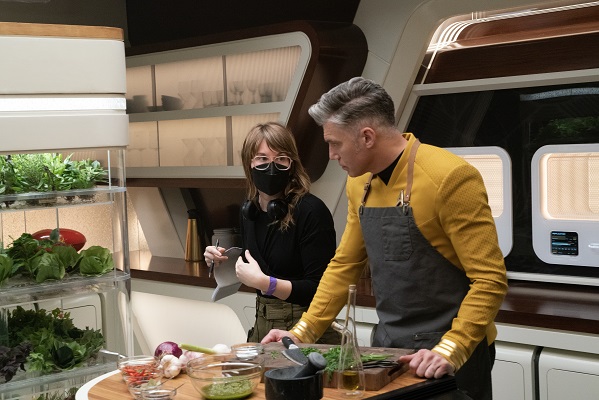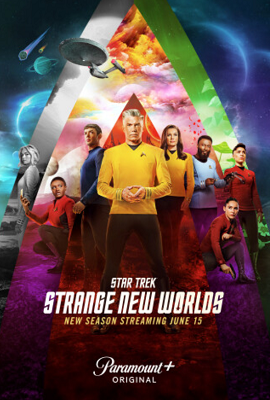TV Interview!

Interview with director Jordan Canning of “Star Trek: Strange New Worlds” on Paramount+ by Suzanne 7/14/23
This was a fun interview. Jordan directed the most recent episode of “Star Trek: Strange New Worlds,” Charades, where Spock and Chapel are in a shuttle accident and rescued by some aliens. When they fix up Spock, they leave out his Vulcan DNA, so he’s suddenly human. He has to deal with all of the human emotions. Making it more difficult for him is that he has an important dinner with his fiancée, T’Pring, and her judgmental family. While Pike, Amanda (Spock’s mother) and the rest of the crew try to help Spock pretend to be Vulcan and get through the dinner, Chapel frantically searches for a way to reverse what the aliens did. It’s a fun episode and really showcases the talents of Ethan Peck (Spock) and Jess Bush (Chapel). I’ve been a Trekkie as long as I can remember, so it was awesome to speak to the episode’s director.
Suzanne: Were you a fan of the show, or of the Star Trek franchise, before you started on this?
Jordan: Yeah, I was a big “[Star Trek: The] Next Generation” fan when I was a kid, and I probably watched, “[Star Trek IV] The Voyage Home” movie two dozen times. I loved that movie so much. And then, when I got the job, season one hadn’t aired yet, but I got to watch cuts of it. I had [seen] the season of “[Star Trek] Discovery” that had Spock in it… I think it’s season two. And then I got to watch season one [of “Star Trek: Strange New Worlds” before it was fully finished, and I was like, “Oh my God, this show is so good!” I loved it because it really reminded me of NextGen. It had that same playfulness to it, and the episodic alien- or planet-of-the-week vibe. And yeah, I got even more excited about the job once I’d seen it.
Suzanne: Well, that’s cool. Now, please forgive my ignorant question here because I’ve mostly interviewed actors, but… as a director, how are you chosen, for a TV episode? Is there anything similar to an audition process?
Jordan: You know, often there’s an interview. Sometimes– usually, your agent would put you up for something. I think with this one, They had reached out to my agent about it. Because of my comedy work and because this was a comedic episode, they wanted a director who was good at comedy. And so, yeah, memory serves that when I got the call from Chris, I was like, “Okay, this is an interview.” And then he was like, “Yeah, you’re great. You got the job.” And I was like, “I did. Oh, okay. Great. Love it.”
Suzanne: It takes the pressure off.
Jordan: Yeah. I called my agent. I was like, “Oh, I think I got the job.”
Suzanne: So, when you direct an episode (I know it’s not like directing a movie), are you in charge, more or less, or is it more of a collaborative process with everybody?
Jordan: Well, I will say, always in TV… you’re sort of working towards the vision of the showrunner, who has the whole show in their head and knows how all the pieces fit together. And there’s usually already a style and tone of the show that’s been set since the pilot, or since at least the first first season that you’re trying to slot yourself into. But what’s really unique about “[Star Trek: Strange New Worlds” is [in reference to what you just said]: It is more like directing a movie. This was more like doing a movie than any TV episode I’ve done before because the episodes are more standalone. They approach them kind of like standalone movies of the week in terms of the tone and the style. And they really work hard to match a director with a script that works with them in terms of the style of the director or their strengths. So I was overjoyed by how much creative freedom I had on this episode. They sort of say, “Okay, you do a big sort of tone download with Henry, the showrunner.” And he’s like, “Okay, here’s the tone meeting.” And then they’re like, “Okay, how do you want to shoot it? How do you want to block it?” There aren’t these rigid rules about, [for example] “This is the way we shoot the closeups, this is when we use handheld, we don’t use handheld at all…” Yada, yada. You can use all of the sort of creative tools in your toolbox that serve the script and serve the story. So it was a real joy to be able to work on this and shape it so much.
Suzanne: That’s great. And, did you encounter any problems or glitches, or was it all smooth sailing?
Jordan: Well, we did… Ethan and I were talking yesterday, and both of us remembered at the same time that we had a COVID shutdown in the middle of our episode… but both of us had forgotten this, but he and Jess both got COVID in the middle of us shooting it. So we had to. There were no other scenes we could shoot because they were in everything. So we had to go down for a couple of weeks. I think the episodes are around 12 days? We’d probably shot maybe seven days, and then they got covid, so we had to go down for a couple of weeks. I think they started shooting the [next] episode and then we picked it back up once they were clear again. So that was kind of the only real, you know, problem.
Suzanne: That’s a pretty major one!
Jordan: Yeah, it was… it was great timing. But, yeah, you know, it happens. It happens so much.
Suzanne: Well, they shoot them pretty far in advance though, right?
Jordan: Oh yeah. Well, it’s such a long VFX post-production process.
Suzanne: Yeah.
Jordan: We were shooting, over a year ago. I shot my episode last May and June. So it was more than a year of [post-production].

Suzanne: Were you worried at all about dealing with such an iconic part of Star Trek history (Spock and the Vulcans), and how fans might react to that?
Jordan: I wanted to treat it with real respect and reverence because I knew that Spock being human for an episode is something that I think has been daydreamed about for many, many years– and decades even. So I knew that this was a very important, iconic thing that we were delivering. I wasn’t nervous about it. No, I just really wanted to be prepared. Ethan and I had so many conversations about how to do it properly and exactly how to fine tune his performance, so that it never felt untethered to the real Spock (who was there, you know, still inside this human Spock). And, you know, making sure that it never went too kind of broad. With comedy, it’s just about anchoring it in reality and not hitting the jokes over the head… playing everything like it’s real. And I think that’s why I find it so fun in this episode is: everybody gets a moment or more to show how great they are at comedy, you know? Everybody gets a fun moment…some great lines, [and] some great reactions. It’s a real showpiece, I think, for just how versatile all of these actors are. And in particular, Ethan and Jess. They really worked so hard on this episode and did such a beautiful job.
Suzanne: And it had such a great ending for the fans, too.
Jordan: And for me! I mean, that’s the end. I was like, “I love it.” I love a big smooch, you know…
Suzanne: And the nice thing about this episode, is that it took you back. If you were a fan of the original show, it took you back all the episodes where they split Kirk into two characters –one good, one bad…things like that.
Jordan: Yeah. Nice. Yeah. I mean, the canon of this is so fun to play in, and there, they take such care and consideration in writing all of these scripts.
Suzanne: Well, I really appreciate you talking to me and I enjoyed it. It was a good episode. Thank you very much.
Jordan: Thank you.
 MORE INFO:
MORE INFO:
ABOUT JORDAN CANNING
Jordan Canning has directed more than a dozen short films which have played at festivals all over the world, including the Tribeca Film Festival, the Toronto International Film Festival and Interfilm Berlin. Among them, COUNTDOWN won a number of awards including a Golden Sheaf for Best Director; NOT OVER EASY swept all three awards at the National Screen Institute Film Festival; and SECONDS won the 2012 TIFF RBC Emerging Filmmakers Competition and the Shaw Media Fearless Female Director Award. Jordan directed all 23 episodes of the CTV digital series SPACE RIDERS: DIVISION EARTH. The show won the 2014 Canadian Screen Award for Best Digital Series and four Canadian Comedy Awards, including Best Director.
Her first feature, WE WERE WOLVES, premiered at the 2014 Toronto International Film Festival. Her second feature, SUCK IT UP, premiered at Slamdance 2017 and won Best Feature Film at the B3 Frankfurt Biennale. Her third feature, an omnibus film called ORDINARY DAYS, won Best Director at the 2018 Canadian Film Festival.
Her television credits include two seasons of the Golden Globe and Emmy Award-winning SCHITT’S CREEK, as well as hour-long dramas – SAVING HOPE (CTV), PRETTY HARD CASES (CBC), BURDEN OF TRUTH (CW), FAMILY LAW (CW), ASTRID AND LILLY SAVE THE WORLD (SYFY) – and half-hour comedies – BARONESS VON SKETCH SHOW (IFC), THIS HOUR HAS 22 MINUTES (CBC), THE LAKE (Amazon) and FRAGGLE ROCK and THE BIG DOOR PRIZE for Apple TV. Most recently she directed for season 2 of STAR TREK: STRANGE NEW WORLDS for CBS and Paramount+. She has won two Canadian Screen Awards and a DGC Award for directing.
Jordan is a 2010 graduate of the Director’s Lab at the Canadian Film Centre and an alumnus of TIFF Talent Lab, TIFF Pitch This!, and Women in the Director’s Chair.
 “Star Trek: Strange New Worlds” Episode 205: “Charades” – Available to stream Thursday, July 13
“Star Trek: Strange New Worlds” Episode 205: “Charades” – Available to stream Thursday, July 13
Directed by Jordan Canning
Written by Kathryn Lyn & Henry Alonso Myers
Logline: A shuttle accident leads to Spock’s Vulcan DNA being removed by aliens, making him fully human and completely unprepared to face T’Pring’s family during an important ceremonial dinner.
In season two of STAR TREK: STRANGE NEW WORLDS, the crew of the U.S.S. Enterprise, under the command of Captain Christopher Pike, confronts increasingly dangerous stakes, explores uncharted territories and encounters new life and civilizations. The crew will embark on personal journeys that will continue to test their resolve and redefine their destinies. Facing friends and enemies both new and familiar, their adventures will unfold in surprising ways never seen before on any “Star Trek” series.
The series stars Anson Mount as Christopher Pike, Rebecca Romijn as Una Chin-Riley, Ethan Peck as Spock, Jess Bush as Christine Chapel, Christina Chong as La’An Noonien-Singh, Celia Rose Gooding as Nyota Uhura, Melissa Navia as Erica Ortegas and Babs Olusanmokun as Joseph M’Benga. Season two also features the return of special guest star Paul Wesley as James T. Kirk and new addition Carol Kane in a recurring role as Pelia.
Season two of STAR TREK: STRANGE NEW WORLDS is produced by CBS Studios, Secret Hideout and Roddenberry Entertainment. Akiva Goldsman and Henry Alonso Myers serve as co-showrunners. Alex Kurtzman, Akiva Goldsman, Jenny Lumet, Henry Alonso Myers, Aaron Baiers, Heather Kadin, Frank Siracusa, John Weber, Rod Roddenberry and Trevor Roth serve as executive producers.
Season two of STAR TREK: STRANGE NEW WORLDS will stream exclusively on Paramount+ in the U.K., Australia, Latin America, Brazil, France, Italy, Germany, Switzerland and Austria. It will also be available to stream on Paramount+ in South Korea, with the premiere date to be announced at a later time. In addition, season two will air on Bell Media’s CTV Sci-Fi Channel and stream on Crave in Canada and on SkyShowtime in the Nordics, the Netherlands, Spain, Portugal and Central and Eastern Europe.The series is distributed by Paramount Global Content Distribution.
Season one is currently available to stream exclusively on Paramount+ in the U.S., the U.K., Latin America, Australia, South Korea, Italy, France, Germany, Switzerland and Austria. It airs on Bell Media’s CTV Sci-Fi Channel and streams on Crave in Canada and on SkyShowtime in the Nordics, the Netherlands, Spain, Portugal and Central and Eastern Europe. The series is distributed by Paramount Global Content Distribution.
Back to the Primetime Articles and Interviews Page


